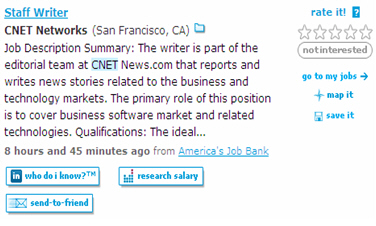DEMOfall 05 take three--nothing non-linear

This is my final wrap-up from DEMOfall 05. The first two installments are here and here, and photo gallery here. Overall, the unveiling of dozens of new products didn't present anything "non-linear," as Hummer Winblad VC Mitchell Kertzman put it. Many of the products were new versions of old products, and very little Web 2.0 mash ups or major flashes of disruptive technology. Nor was it possible to dive very deeply into the products. John Furrier has podcasts of some of the demos.
Software as a service was represented by a few of the companies at DEMOfall 05. Nothing much stood out among them, except that they are good examples of the trend toward adopting hosted, subscription-based services.
SuccessFactors has been around for a while and claims 800,000 subscribers, including several Fortune 1000 companies, for its workforce performance management hosted application. Subscription fees range from $20 to $50 annually, depending on the modules used. That more subscribers than salesforce.com, which last count was at 308,000, and the rest of the on demand CRM players. However, more subscribers doesn't mean more revenue than other on demand players.
NextPage introduced version 2.0 of its document management subscription service, which provides document tracking on a per-user basis for Word, PowerPoint and Excel for $99 per year. iCentera demoed icSuite 2.0, which integrates content management, blogs, analytics and portal creation into an on demand service.
Six Apart demoed Project Comet, a new blogging platform due next year that proposes to up the ante for ease of use to attract more users. It combine the features the company's TypePad (simple blog publishing) and LiveJournal (which has more aspects of social networking, such as sharing parts fo blogs with other users), and allows drag and drop inclusion of various media types.
VideoEgg showed off a browser plug-in that makes it easy capture, edit, encode and post videos online.
One of the more sophisticated search products was Local Matters' Destination Search. It turns the Yellow Pages (a $15 billion business) into an interactive search experience, with rich data and map integration. Local Matters has several Yellow Page services using its platform, which has an extensive ontology based on parsing and normalizing millions of directory listings, according to CEO Perry Evans, who previously founded Jabber and MapQuest. The data could also be used for directory assistance.
Destinator Technologies'Anywhere Server turns a smartphone or PDA with GPS into local search and locator device. For example, you could check for Chinese food restaurants from your location, get a result from a service like Yahoo Local, choose the restaurant, make a reservation, tell your friends in the area to meet you there, get audible GPS guided directions to the restaurant. That's progress.
EasyReach Remote Access seemed useful in that it lets you retrive and forward files and e-mails from a PC using a Blackberry or HTML client.
SimplyHired.com demoed its slick job metasearch, which aggregates more than 4 millon jobs and mashes with maps and social networking (LinkedIn) and ratings.

One of the cooler demos was EptaCam (see image below), a video surveillance system that attempts to protect the privacy of individuals to some degree. The company, Eptascape, calls the technique privacy enhanced security, and the product masks the identity of the person by fuzzing the image. The image can be resolving with proper authorization, whatever that means...
Joy2Shop a 3D e-commerce suite. It includes a toolsets for e-tailers, advertisers, numbers crunchers and shoppers (a client download for the rich environment).
Joy2Shop shoppers walk through the virtual 3D environment and roll over items to get information or to buy, and receive targeted offers from advertisers and even 'blue light' specials, leaving a trail of data that can be instantly utilized by the sellers. Other applications include virtual tours of museums, hotels, etc. but it seems the best use would be in more interactive applications.
FatLens demonstrated its new search technology for comparison shopping. The company claims that its search algorithms and crawlers deliver more precise results. For example, if you search for 'dress shirt' it knows that the two terms are linked and only brings back dress shirts for men. The company already does comparision shopping for tickets, but doesn't just give you the tickets available from various broker services, as well as eBay and craigslist, but includes other data, such as the seat selection for venues.
On the enterprise front, Kenai Systems' eXamine Enterprise was interesting. It automates Web services vulnerability assessment, which is a growing need. Teneros showed a plug-and-play appliance for backing up an Exchange server.